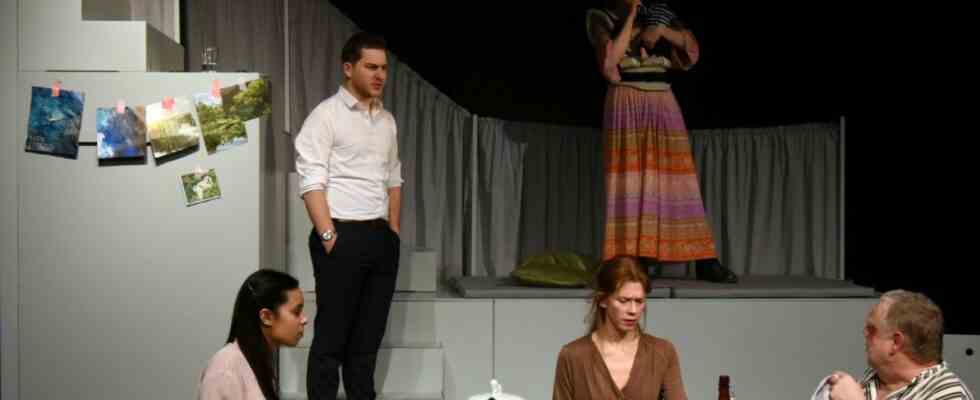It’s a topic that’s often relegated to the corner of the brain that’s responsible for repression: care in old age. Politicians have shown it, the problem can be ignored until an emergency arises. Then it flies in your face, to put it mildly. One would not necessarily have guessed that old age, care and also the approaching death due to old age are subjects that one day push their way onto the stage. Who likes to look at what they tend to put off? And how can such a topic be implemented in a critical, entertaining, dignified, yet theatrical way?
Several evenings show that this is possible, just one at the Landestheater Schwaben with the title “End in laughter”. It is part of a theme trend in which the Munich Kammerspiele were the pioneers. As early as 2021, they released the radio play “Invisible” about a nurse, then the extensively researched evening “Who cares – Can robots care?”. The Residenztheater went to work, if you will, with a little more dramatic tradition and brought an old, near-death couple by Herbert Achternbusch to the stage in the autumn with “Der Stiefel und sein Socks”. In these days things are going to happen: Gerhard Polt and the Well brothers brought “A scheene Leich” to the Kammerspiele on the subject of dying. At the small “Theater … and so forth” a solo with Gerhard Lohmeyer deals with the fact that it should go into the home. The research project “Exit – Dying for Beginners” by Wenzel Winzer has its premiere at the Staatstheater Nürnberg. And Memmingen joins in with “End in laughter”.
Since this season, there has been an interim management at the Landestheater consisting of Christine Hofer and Alexander May. They will be replaced by the director and author Sarah Kohrs in the 2024/25 season, as announced on Wednesday. Hofer and May have titled this season “Other people feel” and commissioned the author Nora Schüssler with a play on care, old age and family, which should be located in the Allgäu. Schuessler has delivered a chamber play, finely nuanced and skilfully structured. The focus is on the head of the family and brewery owner Bonifazius Bengele, tyrannical, power-conscious, and suppressing every weakness. When he falls one day and has to go to the hospital, he is diagnosed with Parkinson’s disease. It’s all downhill from there.
His second, much younger wife Maria and his adult children Ferdi and Leni accompany him on the path of his increasing decline. Ferdi tries to save the brewery, which his father refuses to leave to him. Disputes are the order of the day. Bonifazius’ favorite is Leni, although she is the center of the earth. The conflicts escalate until finally everything collapses.
It’s not about the economic problems
With “Ende in Lachen” Schuessler has not shifted the care problem to the average family, she is not concerned with the often difficult economic side, but with the emotional, also with tradition, encrusted hierarchies, with being overwhelmed and also with how little you do prepared for this development. She gave the characters room to develop. In the basic constellation of a family, she finds enough potential for conflict that can be explosively ignited with the topic of care.
In Memmingen, director Stephan Rumphorst aims to exacerbate the situation, interpret the characters more clearly and incorporate a little early evening series drama. André Stuchlik’s Patriarch belongs in the category of serial meanies, who Mirjam Smejkal is paired with a supple woman. Your forfeits – unnecessary side strand – son Ferdi, softly drawn by Tom Christopher Büning. The intriguer needed in such constellations is daughter Leni, wonderfully egocentrically interpreted by Almut Kohnle.
In spite of all these escalations on Inés Diaz Naufal’s magnificent modular stage, the evening doesn’t just go to waste. The topic catches on because the action on stage describes a probable family situation in many small scenes, confronts the audience and demands a discussion. This is exactly what the other evenings for care in old age do. They use the power of the stage to make obvious what has been suppressed for too long. It’s probably about time for that.

